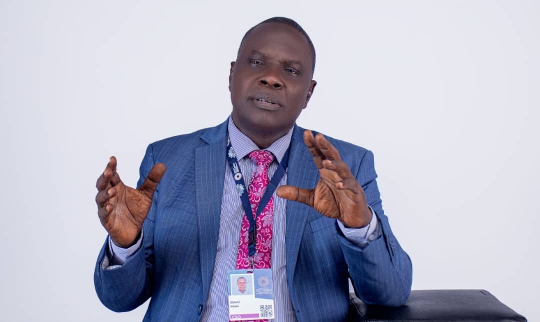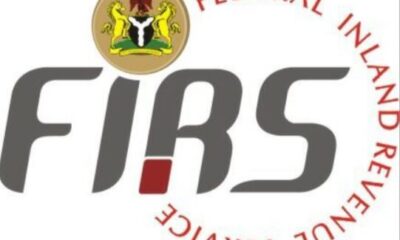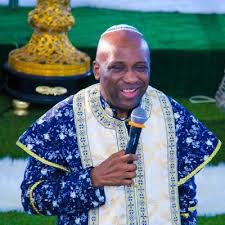News
World Bank Commends NNPCL Public Private Partnership Model

Mr. Olufemi Aduwo, Permanent Representative of Centre for Convention on Democratic Integrity (CCDI) to ECOSOC /United Nations and Chairman, CSO-African Countries Group of World Bank, Civil Society Policy Forum (CSPF) who just returned from the World Bank/IMF boards governors meeting in Morocco speaks in this interview on some pressing issues about the Nigerian economy.
Excerpts…
How would you rate Nigeria’s current debt status, and to what extent might Nigeria’s debt status hamper/accelerate growth?
Since 2023 figures are fluctuating let 2022, be our guide. As at 2022, Nigeria’s debt reached an all-time high of NGN77 trillion. Over the past decade, Nigeria has experienced a notable surge in its debt levels. The debt to GDP ratio has more than doubled from 17.7% to 37.3% in 2022, and over 80% of the country’s revenue is being used to settle or service debt. Spending over 80% on debt servicing leaves about 20% of the country’s revenue thinly spread across other sectors such as health, education, security, road and infrastructure, agriculture, social welfare, etc. While many academic research may argue that increased borrowing increases GDP and household income, this is obviously not the case for Nigeria as it is clear from statistics and the faces of the masses that increasing government debt and loans have amounted to increasing poverty, which can only be attributed to the poor fiscal management in Nigeria.
There are many factors fueling Nigeria’s debt crisis, the main one being fiscal mismanagement. The Nigerian government lacks fiscal discipline. The Fiscal Responsibility Act of 2007 clearly stated that the government at all levels might borrow only for “capital investment” and “human development”. This Act has been flouted over the years and efforts to amend some ambiguities in the Act have not succeeded over the years. For instance, the Act prescribes the inclusion of “borrowing for important reforms of major national importance”. This is ambiguous and most often abused. The terminology is vague and increases the government’s borrowing power. The relevance of the Fiscal Responsibility Act is sabotaged by the lack of strict sanctions to enforce compliance.
The Fiscal Responsibility Commission, just like other oversight Agencies in Nigeria lacks sanction power and is poorly supported. The existing fiscal structure in Nigeria somewhat promotes the lack of accountability, transparency and corruption. For instance, government Audit Reports from the Auditor General’s office are never made for public usage or access. Even the National Assembly and Presidency over the years have ignored this lack of transparency in public reports. How do we fight corruption without public audit reports? The Fiscal Responsibility Act also requires that borrowed funds be managed in a separate account to allow for proper monitoring and a clean spell out of what the debts are used for. However, the norm has been to add the loans to the overall consolidated funds, without a clear public report on what capital projects are funded by the loans. It is sad that the only place where detailed progress reports of projects funded by loans, are the creditor websites, and never the Nigerian government or relevant MDAs public reports. Let me repeat, there is nothing wrong in borrowing if the conditionalities are okay and the purpose for investment. Borrowing to pay salaries is anathema.
One of Nigeria’s most concerning problems currently is the swift loss in value of the local currency. Is that a worry for the World Bank? Would the World Bank at some time in the future be willing to consider debt forgiveness for Nigeria? With what preconditions?
The first reason, which is also the root cause of the naira depreciation, is that supply of dollars into the economy has been declining while demand for dollars remains relatively unchanged courtesy of the country’s huge demand for dollars fuelled by dependence on imported goods for many economic activities. Foreign revenue generation is weak. Devaluation makes a domestic currency less expensive than other currencies, which has two main implications, according to the International Monetary Fund (IMF). “First, devaluation makes the country’s exports relatively less expensive for foreigners. Second, the devaluation makes foreign products relatively more expensive for domestic consumers, thus discouraging imports. This may help to increase the country’s exports and decrease imports, and may therefore help to reduce the current account deficit.”And in Nigeria’s specific case, the free float of the naira ended the Central Bank’s previous regime of foreign-exchange rationing for importers, which limited their capacities to obtain foreign currency, particularly to service their international debt and payment obligations. We note that most of the goods are imported. On Debt forgiveness, not only the World Bank and IMF Nigeria is indebted to, we borrow from China, London and Paris clubs as well.
In 1999 when democracy returned to Nigeria, its total debts stood at $28.04 billion. The figure dropped to $2.1 billion on the famous debt relief secured by President Olusegun Obasanjo. It went up to $7.3 billion under Dr. Goodluck Jonathan in 2015. Under Buhari the figure has gone up by as much as over 400 per cent to $41.8 billion. In October 2005, Nigeria and the Paris Club announced a final agreement for debt relief worth $18 billion and an overall reduction of Nigeria’s debt stock by $30 billion. The deal was completed in April 2006 when Nigeria made the final payment and its books were cleared of Paris Club debt. I doubt if such grace would ever be available to us again, for many obvious reasons.
What areas would the World Bank be willing to partner Nigeria to alleviate its myriad of economic challenges?
The World Bank is always available to provide advice and warning to developing countries on monetary policy and development related issues. It’s left for us to accept or not. The bank provides low-interest loans, zero to low-interest credits, and grants to developing countries. These support a wide array of investments in such areas as education, health, public administration, infrastructure, financial and private sector development, agriculture, and environmental and natural resource management.
Your organisation organised a sideline session on Public Private Partnerships in the just concluded World Bank/IMF boards of governors meetings in Morocco. What were the highpoints of the event?
Let me say this, any country that wants a robust economy and wants to create jobs must stay on top of its infrastructure and related services. But you and l know that government simply cannot afford to finance all the infrastructure costs from the budget. That was the major reason why the session was held. The session was moderated by Imad Fakhoury, World bank Director of infrastructure and PPPs and four renowned economists served in the panel of discussion. Because of the relevant of the topic, 340 guests from 84 countries were in attendance.
During the session, attention was on the tax scheme PPPs model as acceptable among others models, not only that it delivers, it reduces government borrowing. The session, the NNPCL’s involvement in the tax scheme in Nigeria was x-rayed by the panelists and they all agreed that it would serve as catalyst to the economic growth and development, if red tapism did not creep into the financing arrangement. The NNPCL has invested huge amounts in roads construction across the country. Not only that, the World Bank is studying the tax scheme in Nigeria; by the time we meet at World Bank /IMF Boards of Governors meetings in April in Washington DC, definitely the World Bank will issue an official statement on the effectiveness of tax scheme and assistances the bank plans to provide.
On 25 January 2019, President Buhari signed the Executive Order 007 on Road Infrastructure Development and Refurbishment Investment Tax Credit Scheme. The scheme is aimed at closing the gap in the infrastructure deficit plaguing the country, particularly the road transport sector. Under this scheme, private companies are enjoined to fund the construction of major road projects in the six geo-political zones of the country. In return, these companies get a tax credit or reduction equal to the amount invested
What’s your take on the current status of the NNPCL under Mr. Mele Kyari and, do you think the model will impact positively on the nation’s economy. On a larger scale, with NNPCL as a reference point, how can public and private partnership function better in areas of building and managing infrastructure?
Your question is two in one or double barrel. To answer the first part of your question, the current status of the NNPC Ltd is a good omen, a new path to growth and prosperity. The Saudi Arabia National Oil Company (ARAMCO) has been listed on the stock exchange since 2019. Saudi Aramco reported earning $161billion in 2022, claiming the highest ever recorded annual profit by a publicly listed company. That should be the path the NNPCL should follow. I think that should be the path Kyari should follow; the sooner the NNPCL is listed on stock exchange the better. On the Private – Public partnerships, already NNPCL has shown good example. More private companies should follow and government should create enabling environment to encourage others. Infrastructure is a key component of sustainable development.


 News22 hours ago
News22 hours agoNIGERIAN BREWERIES PARTNERS OZA CARNIVAL

 Top Stories10 hours ago
Top Stories10 hours agoTinubu’s Aide Condemns Plan To Reinstall ‘Jesus Is Not God’ Banner In Lekki Mosque

 Top Stories5 hours ago
Top Stories5 hours agoBreaking: FIRS Announces Fresh Recruitment, See Eligibility Criteria, Application Deadline

 News10 hours ago
News10 hours agoPetrol To Sell ₦935/Litre From Today – IPMAN

 Top Stories10 hours ago
Top Stories10 hours ago2025 Budget Cannot Address Nigeria’s Economic Challenges – Atiku

 Entertainment10 hours ago
Entertainment10 hours agoI will be more influential in Nigeria than UK – Tobi Adegboyega

 News10 hours ago
News10 hours agoPresident Tinubu’s reforms not responsible for food stampedes – FG

 Top Stories7 hours ago
Top Stories7 hours agoPrimate Ayodele’s Prophecies For 2025







